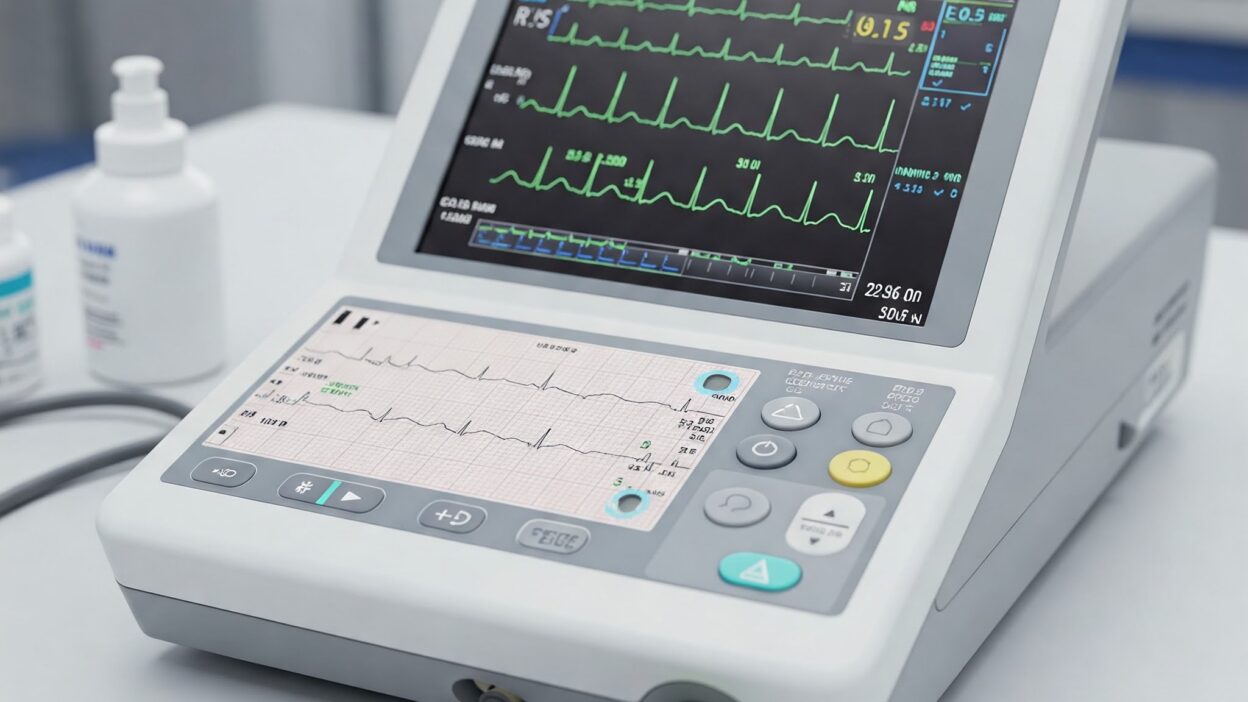Considering booking a private electrocardiogram (ECG)? Private ECG tests offer quicker results and more convenience compared to public options. Learn why you might need one, the types of tests available, and what to expect.
What is a private electrocardiogram (ECG)?
An electrocardiogram (ECG) is a test that measures the heart’s electrical activity. It’s like a window into the heart’s function, providing vital information about how well it’s working. Recording the heart’s electrical signals, an electrocardiogram test assesses the beating pattern, crucial for diagnosing various heart conditions. The test itself is straightforward and usually takes less than fifteen minutes, during which electrodes are placed on your skin to detect the heart’s electrical activity.
ECGs are incredibly versatile and can detect several heart conditions, from arrhythmias to coronary heart disease. The electrical signals captured by the ECG machine are displayed as wave patterns, which healthcare professionals analyse to evaluate heart conditions and overall heart health. This non-invasive test provides a quick and efficient way to measure the heart’s electrical activity, offering valuable insights into potential heart problems through ECG scans.
A reassuring aspect of an ECG is that it involves no electrical transmission to the body. The electrodes simply detect the heart’s electrical activity, ensuring the procedure is safe and painless. Whether you’re experiencing symptoms or have risk factors for heart disease, an ECG can be a crucial tool in your healthcare arsenal.

When to Consider a Private ECG Test
When should you consider a private ECG test? The answer often lies in the symptoms you’re experiencing or your personal and family medical history. Common symptoms that may prompt a consultation include chest pain and arrhythmias, both of which are serious and warrant further investigation. Experiencing unexplained chest pains warrants an ECG to rule out any underlying heart conditions.
Family history also plays a significant role. If there’s a history of heart disease in your family, your healthcare provider may recommend an ECG to monitor your heart’s health. Additionally, if you have risk factors such as an irregular heartbeat, a private ECG test can offer a swift and convenient way to get the clarity you need.
A private ECG can offer quicker access to testing and results, enabling prompt action if necessary.
Types of ECG Tests Available Privately
Private ECG tests come in several forms, each tailored to provide specific insights into your heart’s health. The three main types are resting ECG, exercise ECG (stress test), and ambulatory ECG.
A resting ECG monitors your heart activity while at rest, helping to detect conditions like arrhythmias and coronary heart disease. An exercise ECG evaluates how your heart functions under stress using an exercise bike or treadmill.
Lastly, an ambulatory ECG provides continuous monitoring of your heart activity over an extended period, often ranging from 24 hours to a week, to catch intermittent heart problems.
Resting ECG
A resting ECG is a fundamental test designed to monitor the heart at its base activity levels. This can detect abnormalities such as arrhythmias and coronary artery disease, which might not be apparent during physical activity. The procedure is simple and quick, typically completed in just a few minutes. During the ecg testing, you will lie down in a comfortable position while electrodes are attached to your skin to measure the heart’s electrical activity.
The resting ECG is an essential tool for evaluating heart health, providing valuable insights quickly and efficiently. Its ability to detect underlying heart conditions makes it a crucial component of routine heart assessments. If you’re experiencing symptoms or have risk factors for heart disease, a resting ECG can be the first step in understanding your heart’s condition.
Exercise ECG (Stress Test)
An exercise or fitness ECG, also known as a stress ECG test, evaluates how your heart performs under physical stress. This test is particularly useful for detecting issues that might only become apparent during exercise. So if you’re preparing for a marathon, Iron Man, HYROX, a cycling event or any other kind of fitness challenge where you push your body to its limits, it may be worth considering a stress ECG.
During the test, electrodes are attached to your chest while you exercise on a bike or treadmill. The aim is to increase your heart rate to assess how well your heart handles physical activity.
The exercise ECG test lasts between 15 minutes to an hour, depending on your heart’s response to the stress. The clinician overseeing the test will gradually increase the difficulty over time, until your heart rate increases towards the top of its upper range, and they will stop the test when they have all the data they need.
It’s important to prepare adequately by avoiding heavy meals and caffeine before the test. This type of ECG is often recommended if you experience symptoms like chest pain during exercise or if there’s a need to evaluate heart valve or chamber issues.
Monitoring your heart’s electrical activity during exercise gives healthcare professionals valuable insights into your heart’s health. This information is crucial for diagnosing conditions such as coronary heart disease and determining the most appropriate treatment or lifestyle changes.
Ambulatory ECG
An ambulatory ECG is designed for continuous monitoring of your heart’s activity, making it ideal for detecting intermittent heart problems that might not show up during a standard ECG test. This test involves wearing a portable ECG device for an extended period, typically ranging from 24 hours to two weeks. The device records your heart’s electrical activity throughout your daily life, providing a comprehensive overview of your heart health.
This test is particularly useful for patients who experience irregular heartbeats or other symptoms sporadically. Capturing detailed data over a longer period, an ambulatory ECG helps identify issues that might otherwise go unnoticed.
The Process of Getting a Private ECG Test
The journey to getting a private ECG test often begins with an initial consultation to determine the necessity and type of ECG required. During this consultation, your healthcare provider will discuss your symptoms, medical history, and any risk factors to recommend the most appropriate test. Patients typically have the option to receive their ECG test in various settings, including hospitals or dedicated clinics.
Once the type of ECG is determined, the procedure is straightforward. During a resting ECG, you lie down for about five minutes while electrodes measure your heart’s electrical activity. The entire appointment usually lasts around 30 minutes, and the results are typically available soon after the test is completed. A significant advantage of private ECG tests is their minimal wait time for results, enabling prompt medical decisions.
After your ECG test, you can immediately return to your normal activities as the procedure is non-invasive and poses no real risks (although you might be a bit tired and in need of a shower if you’ve done a stress ECG!). The process is designed to be as convenient and efficient as possible, ensuring you get the insights you need with minimal disruption to your daily life.
About our Content
skreen is not a medical provider and does not diagnose or treat conditions. Our content is informational and should not replace professional medical advice.
We’re serious about being a trusted source of information and sharing only the highest quality, medically reviewed content. You can review our Content & Editorial Policy here.




